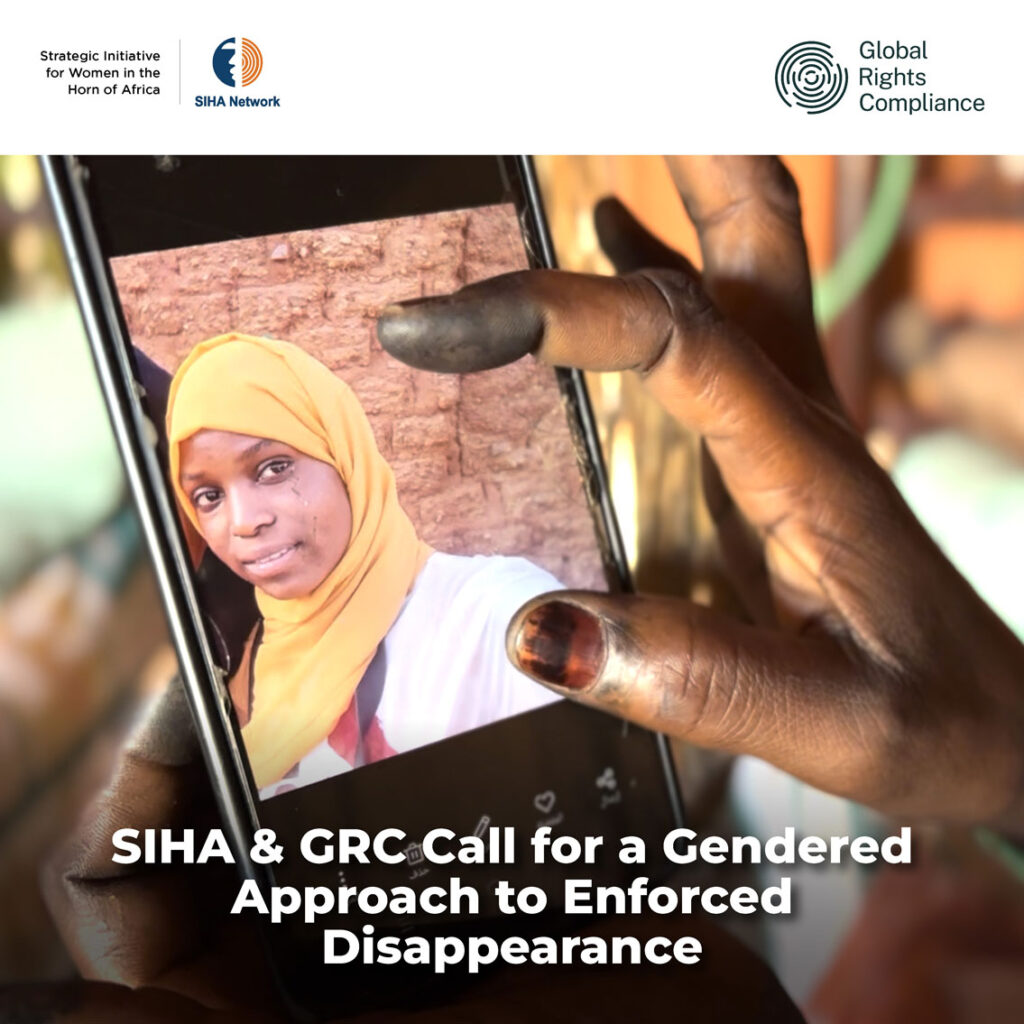
The enforced disappearance of women and girls is one of the most grievous forms of gender-based violence, particularly in conflict-affected areas, and it must be recognised as such in order to ensure access to justice and adequate redress, currently unavailable to thousands of survivors and their families around the globe and especially in the context of the ongoing armed conflict in Sudan.
Global Rights Compliance (GRC), together with the Strategic Initiative for Women in the Horn of Africa (SIHA), submitted inputs to the UN Committee on Enforced Disappearances (CED) on its draft General Comment on “Women, Girls and Enforced Disappearances.”
In the context of the current conflict in Sudan, hundreds of women and girls have been abducted, kidnapped and subjected to the worst forms of violence, while the fate and whereabouts of most victims remain unknown. Enforced disappearance has been specifically leveraged as a tool for the commission of gender-based violence in Sudan and is invariably connected to other forms of sexual gender-based violence (SGBV), such as rape, enslavement, enforced pregnancy, and femicide, among others. There are reports of women being held in ‘slave markets’ and of women being disappeared and held for several months while subjected to rape and gang rape. The vast majority of cases have been attributed to the Rapid Support Forces (RSF). In this sense, enforced disappearance is both a distinct form of gender-based violence and a vehicle for other forms of violence.
Currently, it is estimated that there are approximately 50,000 cases of enforced disappearance countrywide. Through its own documentation efforts SIHA has verified approximately 291 cases affecting women and girls, with 88% of the victims remaining disappeared. However, this number may be significantly higher noting the concealed nature of this crime, the issues of stigma, discrimination, and trauma facing survivors and their families, and the lack of official, gender-sensitive registries, thereby impeding reporting.
As in other parts of the world, survivors and families of disappeared women and girls in Sudan face multiple barriers in filing complaints and searching for their loved ones, and government responses have been insufficient. Survivors and their families are often subjected to trauma, stigma, gender stereotypes and criminalisation, with very limited services able to holistically support them, all of which impede access to justice.
In our submission, GRC and SIHA highlighted the need to progressively interpret the International Convention for the Protection of All Persons from Enforced Disappearance (‘the Convention’), utilising a gender approach to fully recognise the enforced disappearance of women and girls as a form of gender-based violence, as well as its gendered and intersectional dimensions and impacts. This includes the legal implications of non-State actors and armed groups as perpetrators of these acts, as well as the need to address the barriers faced by survivors and their families in accessing justice. The submission also delves into the necessity of implementing a gender approach to reparations, and to survivors and families’ right to participation and the right to truth in connection with all justice-related processes, including investigations and search efforts.
It is critical to acknowledge that the enforced disappearance of women and girls is both a consequence of and reinforces existing gender inequalities and rampant gender-based violence, including in contexts such as Sudan where the enforced disappearance of women and girls is being used as a weapon of war, terror, suppression and intimidation. GRC’s Gender and Child Justice Division Lead Ruby Axelson notes that,
“The suffering across Sudan is epitomised by the unheard crisis of missing women and girls. As the crisis escalates, victims remain missing and at risk of sexual violence, sexual slavery and trafficking, while their families continue a painful search. This Submission examines the gendered manifestations of enforced disappearance in Sudan and calls on the CED to strengthen relevant legal and protective frameworks. In doing so, the CED should elaborate on how enforced disappearance is intrinsically linked to and exacerbates underlying gender inequalities, how and why women and girls are targeted differently to men, and how these acts impact women and girls differently because of their gender and other intersectional identities.”
SIHA Regional Director Hala Al- Karib underscores that,
“Since the beginning of the Sudan war in April 2023, hundreds of women and girls have been forcibly disappeared silently, as if nothing is happening. Their families are living in such agony, overwhelmed with the consequences of not knowing what happened to their loved ones. Amidst a broken justice system and a war that weaponizes the bodies of women and girls, the enforced disappearance of women and girls often slips through the cracks. This submission is meant to raise awareness on this horrific war crime, the critical need for a gendered response in combatting it and the obligation to respond to both victims and their families.”
SIHA and GRC call for a robust gender and intersectional approach to enforced disappearances of women and girls in the forthcoming CED General Comment, towards ensuring that remedies under the Convention are available to survivors and their families, for whom justice currently remains elusive.
Want to learn more? Read SIHA’s in-depth report on the crisis and the alarming patterns of enforced disappearances of women and girls in Sudan.
#JusticeForSudaneseWomen #GenderBasedViolence #BringSudansMissingWomenAndGirlsBack #KeepEyesOnSudan
